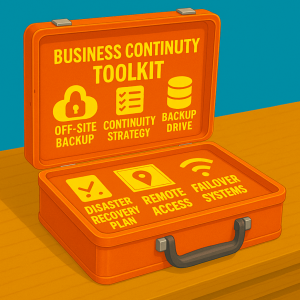
Power outages, cyberattacks, hardware failures, and natural disasters rarely arrive with a warning. When they hit, the consequences for small businesses can be severe. Many believe having backups is enough—but restoring a file isn’t the same as staying operational. If you lose access to systems, can’t support remote work, or leave clients in the dark, a brief disruption can quickly spiral into long-term damage.
A trusted IT partner shouldn’t just install backups. They should give you a complete business continuity plan—a roadmap to keep your business running, no matter what.
Backups Aren’t Enough – You Need Continuity
Backups are essential. But they only address one piece of the puzzle. A business continuity plan is a proactive strategy to maintain operations during and after a disaster. Without it, a power outage or ransomware attack can bring your business to a standstill.
Consider this: a backup stored on a local server won’t help if that server is underwater or encrypted by a hacker. Without a plan to restore systems, support your staff, and serve clients, your recovery could take days—or weeks.
Book a free discovery call to find out if your business is prepared for the unexpected.
Backups vs. Business Continuity: Know the Difference
Here’s how most businesses get it wrong:
-
Backups help you recover data.
-
Continuity helps you stay operational.
A strong continuity plan addresses:
-
How quickly can you resume operations?
-
Can your team work remotely if the office is offline?
-
What systems are mission-critical?
-
Who activates the recovery plan?
Key elements should include:
-
Encrypted, off-site, and immutable backups
-
Prioritized recovery timelines (RTO/RPO)
-
Remote access readiness
-
Failover systems for essential operations
-
Routine disaster simulations and testing
If your IT provider can’t walk you through these answers confidently, you’re not prepared—you’re just lucky.
Real Disasters, Real Consequences
This isn’t fearmongering. It’s fact.
-
Hurricanes in Florida displaced hundreds of businesses. Those without cloud access couldn’t function.
-
Flooding in North Carolina wiped out servers, deleting months of financial records.
-
Wildfires in California destroyed entire offices that lacked off-site backups.
-
Small businesses hit by ransomware discovered their backups were never tested—or worse, they were corrupted.
These are not enterprise-level disasters. They’re everyday threats that hit small businesses just like yours.
Sign up for our Cybersecurity Tip of the Week to stay ahead of these evolving risks.
Ask These Questions Before Disaster Strikes
If a disaster hits tomorrow, will your business be able to continue operating?
Ask your IT provider:
-
If we get hit with ransomware, how fast can we recover?
-
Are our backups tested regularly? What systems are covered?
-
What’s the plan if fire or flooding takes out our building?
-
Are we compliant with industry regulations?
-
Can our team work remotely without skipping a beat?
If you’re unsure about any of the answers, you might already be vulnerable.
Disasters Happen. Downtime Doesn’t Have To.
You can’t control storms, outages, or hackers—but you can control how your business responds.
A good IT provider helps you recover.
A great one ensures you never skip a beat.
Explore how our Project Services can help you build a solid business continuity plan before disaster strikes.
Schedule your FREE Network Assessment today, and let’s make sure a power outage never becomes a business-ending event.



